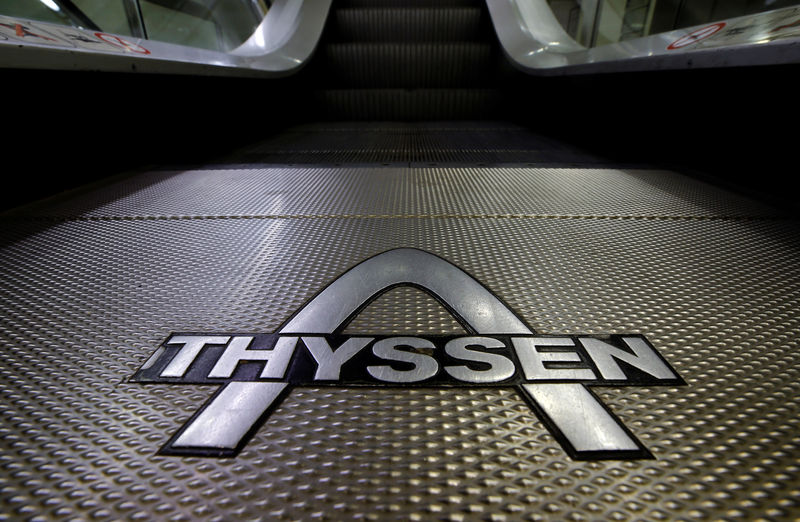This post was originally published on this site
https://i-invdn-com.akamaized.net/news/LYNXNPEF0A0AY_M.jpg © Reuters.
© Reuters.By Geoffrey Smith
Investing.com — Germany’s ThyssenKrupp, one of Europe’s industrial blue-bloods, is in a race against time to sell its most valuable asset before being swallowed by its debts – and it’s just had to hobble itself in the process.
The group announced on Monday that it would seek to sell its elevators unit to one of two private equity consortia, rather than to Finnish rival Kone Oyj (HE:). Kone subsequently withdrew its bid, which was reported to be over 1 billion euro higher than either of its rivals at more than 17 billion euros ($18.4 billion).
As a result, Thyssenkrupp (DE:) shares were down 6.3% by 5:30 AM ET (1030 GMT) at a four-month low, underperforming the broader market on a down day for markets spooked by a warning from Apple (NASDAQ:) about the impact of the Covid-19 outbreak on sales.
The German was down 0.7%, while the benchmark was down 0.5% at 430.02.
Thyssenkrupp (DE:) has opted for a sale that it knows will get approval from regulators, rather than one that was likely to be bogged down for months by an antitrust investigation. Between them, Thyssenkrupp and Kone have around 30% of the world market for elevators. A combination would have increased concentration in an already concentrated business. Regulators are particularly anxious when a market goes from having four major players to having three, which is what a TK/Kone combination would have done.
It was a close call, though. Thyssenkrupp (DE:) and Kone are the number 3 and 4, respectively, in their field, behind Otis and Schindler. The U.S. has just waved through a merger of Sprint and T-Mobile, who have similar positions in the U.S. wireless networks market. However, the more relevant analogy is with the failed Siemens-Alstom rail merger, rejected by the EU Commission because of the near-monopoly it would have created within Europe.
Thyssenkrupp (DE:) does not have the luxury of waiting to see which way Commissioner Margarete Vestager’s thumb will turn. It has been haemorrhaging cash due to a misjudged expansion in Brazil, chronic margin compression from Chinese steel exports to Europe, a downturn in the auto market and a crushing pension burden (which only gets heavier the longer than the European Central Bank’s interest rates stay below zero).
Even before its announcement on Monday, Moody’s Investor Service had downgraded the company’s long-term credit rating to B1 – “highly speculative” – in the wake of first-quarter earnings that included a horrific 2.5 billion-euro cash outflow before asset disposals.
“The magnitude of the earnings decline and cash drain in Q1 2020 was more severe than anticipated,” Moody’s warned, adding that TK’s targets for the fiscal year through September appear “increasingly ambitious.”
TK now has a shortlist of two buyers: a consortium of Blackstone (NYSE:), Carlyle (NASDAQ:) and Canadian Pension Plan Investment Board; and on the other hand, Advent and Cinven.
“The objective is to reach an agreement quickly on a majority or full sale,” it said in a statement. If it can’t strike a deal with either, then it will aim for an IPO of the unit in early summer.
Fusion Media or anyone involved with Fusion Media will not accept any liability for loss or damage as a result of reliance on the information including data, quotes, charts and buy/sell signals contained within this website. Please be fully informed regarding the risks and costs associated with trading the financial markets, it is one of the riskiest investment forms possible.

